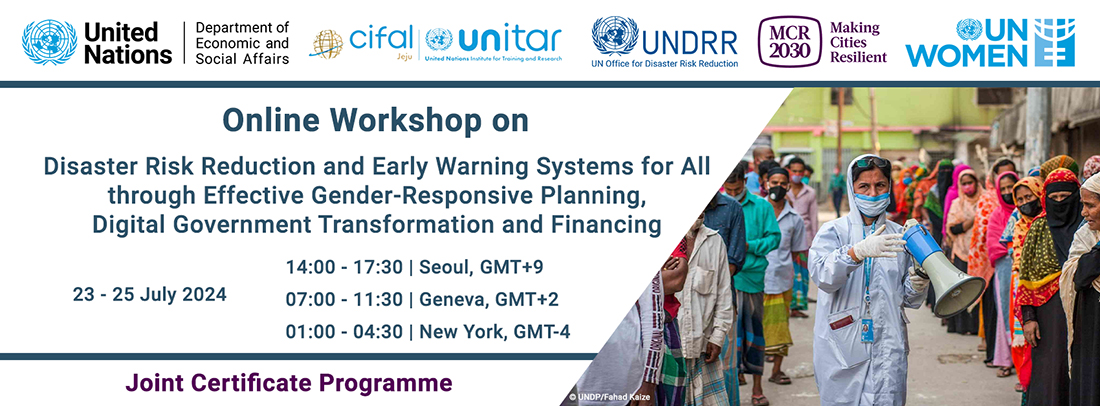CAPACITY DEVELOPMENT
Online Workshop on Disaster Risk Reduction and Early Warning Systems for All through Effective Gender-Responsive Planning, Digital Government Transformation and Financing
July 02, 2024

Organised by
United Nations Department of Economic and Social Affairs (UN DESA), through
the Division for Public Institutions and Digital Government (DPIDG) and its project office - United Nations Project Office on Governance (UNPOG),
United Nations Institute for Training and Research (UNITAR) CIFAL Jeju/Jeju International Training Center (JITC),
UN Office for Disaster Risk Reduction (UNDRR) Global Education and Training Institute (GETI) and Making Cities Resilient 2030 (MCR2030),
UN Women Centre of Excellence for Gender Equality with support from the Incheon Metropolitan City and the Ministry of the Interior and Safety (MOIS) of the Republic of Korea
Background
The Online Workshop on Disaster Risk Reduction and Early Warning Systems for All through Effective Gender-Responsive Planning, Digital Government Transformation and Financing will introduce concepts and tools to help ensure effective and people-centered Disaster Risk Reduction (DRR) and Early Warning Systems (EWS), and gender-responsive approaches, tools, checklists, and good practices for gender mainstreaming. It will provide a comprehensive understanding of concepts, tools, approaches, and limitations related to designing and implementing multi-hazard early warning systems at the national, local, and regional levels. In particular, participants will be introduced to practical tools for local planning and MHEWS gap assessment developed under the Making Cities Resilient (MCR2030) initiative, which was launched in 2020 to foster inclusive, safe, resilient, and sustainable cities by 2030, directly contributing to Sustainable Development Goal 11 (SDG11) and other global frameworks such as the Paris Agreement and the New Urban Agenda.
Moreover, the training will introduce the Handbook on Strengthening Resilience in Cities and Local Communities through Innovation and Digital Government, along with the Toolkit on Risk-informed Governance and Innovative Technology for Disaster Risk Reduction and Resilience. These resources, part of UN DESA’s Curriculum on Governance for the Sustainable Development Goals, will provide specific guidance on leveraging innovative technologies for DRR and resilience while integrating gender considerations seamlessly. Furthermore, the training will showcase government initiatives on gender mainstreaming, and inclusive EWS. The training will also assess financial readiness for disaster risk reduction and leverage global finance to address challenges in implementing gender-mainstreamed, disaster-resilient governance and planning with a special focus on disseminating EWS.
Objectives
- Improve understanding of key DRR and EWS concepts and support gender-responsive localization and implementation of the Sendai Framework for DRR;
- Enhance familiarity with Making Cities Resilient 2030 (MCR2030) resources;
- Introduce the Handbook on Strengthening Resilience in Cities and Local Communities through Innovation and Digital Governance as well as the Toolkit on Risk-Informed Governance and Innovative Technology for DRR and Resilience;
- Improve understanding of the 11 principles of effective governance;
- Introduce financing framework and knowledge for enhancing resilience;
- Enhance the understanding of gender equality, human rights and disaster risk reduction concepts and its interlinkages;
- Promote gender-responsive approaches, tools, checklists, and good practices for gender mainstreaming in DRR
Note: A joint certificate of participation to participants upon successful completion and meeting the requirements of the training will be issued by the UN DESA/DPIDG/UNPOG, UNITAR CIFAL Jeju/JITC, UNDRR ONEA & GETI, and UN Women.
Documents
Presentation Materials
Day 1
Opening Session
Welcoming Remarks
- Mr. Byung Hwa Chung, Director, UNITAR CIFAL Jeju/JITC, Jeju, Republic of Korea
Introductory Remarks
- Ms. Hyeyoung Kim, Head of UN Project Office on Governance, DPIDG/UN DESA, Incheon, Republic of Korea
- Mr. Sanjaya Bhatia, Head of Office, UN Office for Disaster Risk Reduction (UNDRR ONEA & GETI), Incheon, Republic of Korea
- Ms. Jeongshim Lee, Director, UN Women Centre of Excellence for Gender Equality
Orientation
- Ms. Hyunju Grace Lee, Program Officer, UNITAR CIFAL Jeju/JITC, Jeju, Republic of Korea
Session I - Setting the Scene: Disaster Risk Reduction and Gender-responsive Early Warning and Early Action
- Ms. Daria Mokhnacheva, Programme Management Officer, UN Office for Disaster Risk Reduction (UNDRR ONEA & GETI), Incheon, Republic of Korea
- Mr. Sanjaya Bhatia, Head of Office, UN Office for Disaster Risk Reduction (UNDRR ONEA & GETI), Incheon, Republic of Korea
- Ms. Vu Phuong Ly, Gender Training Specialist, UN Women Centre of Excellence for Gender Equality
Day 2
Session II - Digital Government Transformation and AI for Early Warning Systems: Accelerating Resilience and Gender-Responsive Sustainable Development
- Mr. Samuel Danaa, Associate Capacity Development Expert, MOIS, Republic of Korea
- Dr. Cho Jaewoong, Team Leader, Inundation Prediction Research Team, National Disaster Management Research Institute (NDMI), MOIS, Republic of Korea
- Mr. Tomonori Hiroike, Director for Planning and Coordination, Office of the Governor for Policy Planning, Tokyo Metropolitan Government, Japan
- Ms. Rocela Angelica B. Gorospe, Chief Science Research Specialist, Department of Science and Technology Region 2, Philippines
- Mr. Eunkoo Lee, Research and Data Specialist, UN Women Centre of Excellence for Gender Equality, Republic of Korea
- Ms. Sama Shrestha, Programme Specialist, Humanitarian, DRR and Climate Action Programme, UN Women Nepal Country Office
Day 3
Session III - Financing Framework for Disaster Risk Reduction and Early Warning Systems
- Dr. Yanis Kuhn von Burgsdorff, Economic Affairs Officer, UN DESA Financing for Sustainable Development Office
- Dr. Sayel Cortes, Consultant - Resilient Infrastructure and Finance for Resilience, UNDRR
- Mr. John Harding, Head of the CREWS Secretariat, World Meteorological Organization
- Ms. Phuong Ly, Gender Training Specialist, UN Women Centre of Excellence for Gender Equality
- Ms. Makereta Konrote, Consultant for WRD Programme, UN Women Fiji
Video Recording
Contact
UN DESA/DPIDG
Mr. Juwang Zhu, Director, DPIDG/UN DESA
Ms. Adriana Alberti, Chief, Programme Management and Capacity Development Unit, DPIDG/UN DESA | alberti@un.org
UN DESA/DPIDG/UNPOG
Ms. Hyeyoung Kim, Head, UN Project Office on Governance (UNPOG), DPIDG/UN DESA
Ms. Ana Cristina Thorlund, Governance and Public Administration Expert, UNPOG/DPIDG/UN DESA | thorlund@un.org
MOIS, Republic of Korea
Mr. Samuel Danaa, Associate Capacity Development Expert, MOIS | danaasamuel17@gmail.com
UNITAR CIFAL Jeju
Amb. Byung Hwa Chung, Director, UNITAR CIFAL Jeju
UNDRR ONEA & GETI
Mr. Sanjaya Bhatia, Head, UNDRR ONEA & GETI
UN WOMEN


